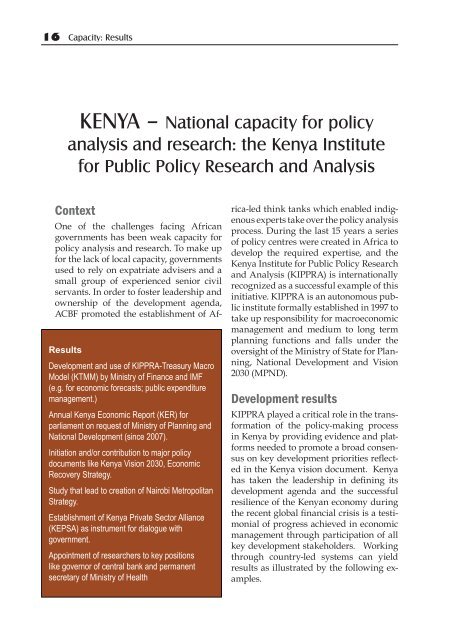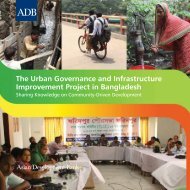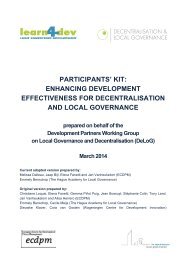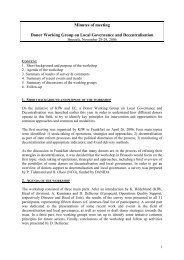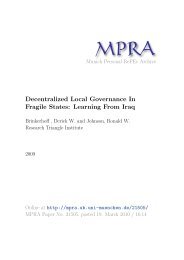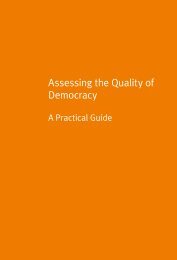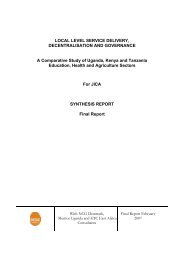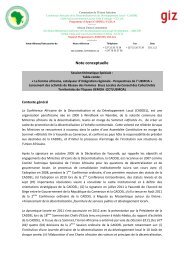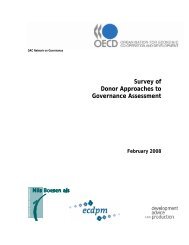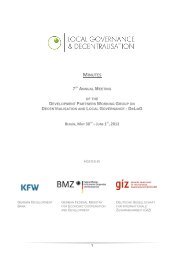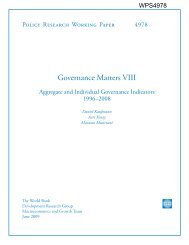Case stories on capacity development and sustainable results
Case stories on capacity development and sustainable results
Case stories on capacity development and sustainable results
You also want an ePaper? Increase the reach of your titles
YUMPU automatically turns print PDFs into web optimized ePapers that Google loves.
16 Capacity: ResultsKENYA – Nati<strong>on</strong>al <strong>capacity</strong> for policyanalysis <strong>and</strong> research: the Kenya Institutefor Public Policy Research <strong>and</strong> AnalysisC<strong>on</strong>textResultsDevelopment <strong>and</strong> use of KIPPRA-Treasury MacroModel (KTMM) by Ministry of Finance <strong>and</strong> IMF(e.g. for ec<strong>on</strong>omic forecasts; public expendituremanagement.)Annual Kenya Ec<strong>on</strong>omic Report (KER) forparliament <strong>on</strong> request of Ministry of Planning <strong>and</strong>Nati<strong>on</strong>al Development (since 2007).Initiati<strong>on</strong> <strong>and</strong>/or c<strong>on</strong>tributi<strong>on</strong> to major policydocuments like Kenya Visi<strong>on</strong> 2030, Ec<strong>on</strong>omicRecovery Strategy.Study that lead to creati<strong>on</strong> of Nairobi MetropolitanStrategy.Establishment of Kenya Private Sector Alliance(KEPSA) as instrument for dialogue withgovernment.Appointment of researchers to key positi<strong>on</strong>slike governor of central bank <strong>and</strong> permanentsecretary of Ministry of HealthOne of the challenges facing Africangovernments has been weak <strong>capacity</strong> forpolicy analysis <strong>and</strong> research. To make upfor the lack of local <strong>capacity</strong>, governmentsused to rely <strong>on</strong> expatriate advisers <strong>and</strong> asmall group of experienced senior civilservants. In order to foster leadership <strong>and</strong>ownership of the <strong>development</strong> agenda,ACBF promoted the establishment of Africa-ledthink tanks which enabled indigenousexperts take over the policy analysisprocess. During the last 15 years a seriesof policy centres were created in Africa todevelop the required expertise, <strong>and</strong> theKenya Institute for Public Policy Research<strong>and</strong> Analysis (KIPPRA) is internati<strong>on</strong>allyrecognized as a successful example of thisinitiative. KIPPRA is an aut<strong>on</strong>omous publicinstitute formally established in 1997 totake up resp<strong>on</strong>sibility for macroec<strong>on</strong>omicmanagement <strong>and</strong> medium to l<strong>on</strong>g termplanning functi<strong>on</strong>s <strong>and</strong> falls under theoversight of the Ministry of State for Planning,Nati<strong>on</strong>al Development <strong>and</strong> Visi<strong>on</strong>2030 (MPND).Development <strong>results</strong>KIPPRA played a critical role in the transformati<strong>on</strong>of the policy-making processin Kenya by providing evidence <strong>and</strong> platformsneeded to promote a broad c<strong>on</strong>sensus<strong>on</strong> key <strong>development</strong> priorities reflectedin the Kenya visi<strong>on</strong> document. Kenyahas taken the leadership in defining its<strong>development</strong> agenda <strong>and</strong> the successfulresilience of the Kenyan ec<strong>on</strong>omy duringthe recent global financial crisis is a testim<strong>on</strong>ialof progress achieved in ec<strong>on</strong>omicmanagement through participati<strong>on</strong> of allkey <strong>development</strong> stakeholders. Workingthrough country-led systems can yield<strong>results</strong> as illustrated by the following examples.


